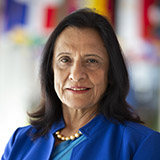Policymakers are responsible for road safety. They are responsible for legislating speed, designing safe infrastructure, overseeing the enforcement of traffic laws and vehicle safety standards, and raising public awareness. They are also responsible for ensuring the provision of quality post-crash care. In short, policymakers are responsible for each and every facet of how roads and vehicle regulations are governed.
Owning those responsibilities is critical. Every year, 1.35 million lives are lost globally due to road traffic crashes. Between 20 and 50 million more people are injured. The WHO South-East Asia region is one of the world’s most affected regions, with just over 400 000 road traffic deaths estimated to occur annually. That equates to almost 1100 fatalities a day. As the UN Road Safety Collaboration (which WHO coordinates) and its Global Plan for the Decade of Action for Road Safety 2011-2020 emphasises, enforcing good legislation is the primary means to reduce this burden. WHO has worked with Member States across South-East Asia region (and with multiple sectors), to promote the changes needed to enhance road safety and reduce road traffic crashes.
But as the Collaboration’s “safe systems” approach makes clear, the potential to advocate change is open to any organization that wants to make a positive difference. Leveraging that potential is the specific focus of this year’s UN Global Road Safety Week, which highlights the primacy of policymakers, while also acknowledging how leadership can come from multiple sources, including civil society, NGOs, foundations, schools and universities. Notably, it can also come from the automotive industry itself.
That is an important point. There are immense opportunities across the South-East Asia Region, as elsewhere, for the automotive industry to increase its responsible engagement on road safety issues and help reduce the toll of injury and death that plagues the South-East Asia region’s roads. This is especially crucial as populations region-wide become increasingly mobile.
The first—and most obvious—way the automotive industry can drive change is through design. Though just two of South-East Asia region’s countries currently apply any of the seven priority international vehicle safety standards, there is nothing stopping manufacturers from incorporating basic safety technologies such as seat-belts into the vehicles they produce and sell in the South-East Asia region. These are, after all, a fraction of the advanced technologies incorporated into the vehicles designed and sold elsewhere, where safety standards and their enforcement are more robust. This is one among other reasons why 93% of all road traffic deaths occur in low- and middle-income countries, despite these countries accounting for around 60% of the world’s vehicles.
A second opportunity for the automotive industry to promote change is through responsible advertising. Advertising that focuses on a vehicle’s speed or depicts reckless or unsafe driving is advertising that has the potential to maim, injure, or kill. This is particularly the case for young drivers, who are more vulnerable to media and the behavioral expectations it produces. Importantly—and in addition—the glamorisation of unsafe driving puts vulnerable road users such as pedestrians, cyclists and motorcyclists at greater risk, with vulnerable road users accounting for more than half of all road traffic deaths. That is unacceptable.
A third opening for the automotive industry to embrace responsibility is via the uptake of innovative ideas and interventions. By including a full-face, safety-approved helmet with the purchase of a motorcycle, for example, the protection of motorcyclists can be greatly enhanced. And by sponsoring government-approved road safety messaging and awareness campaigns, industry can positively influence the safety of our roads and the systems and behaviours that define it. As the Global Road Safety Partnership, which contains both public and private members—including WHO—demonstrates, the scope for collaboration in a range of areas is significant. It should be vigorously embraced.
While enhancing road safety will always be dependent on good public policy (which WHO is committed to supporting Member States develop), as this year’s UN Global Road Safety Week underscores, we can all demonstrate the leadership needed to promote lasting change. We needn’t be shy in doing so. As part of that, we also needn’t be shy in highlighting how the automotive industry itself can further contribute to reducing the determinants of road traffic crashes and the tragic impact they have for individuals, communities, and countries.
Poonam Khetrapal Singh is the Regional Director for WHO South-East Asia
Competing interests: None declared

